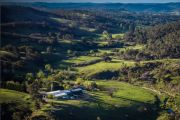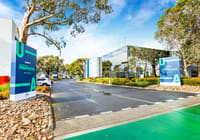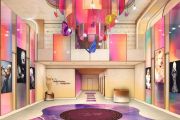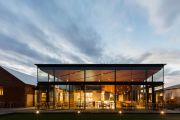
Power family’s BMD wants to double revenue to $4b
BMD, the land developer and contracting company owned by the Power family, aims to double its revenue to $4 billion over the next 7 years as residential and infrastructure projects pick up in its home market of Queensland and by expanding its offshore business.
BMD, which reported a 9 per cent increase in revenue to $2 billion in the year to June, said profitability improved on projects in Queensland and all regions it operated in delivered better than expected profits, even as weather delays increased across many projects.

“To double that is a significant undertaking,” chief executive Scott Power told The Australian Financial Review.
“But we do think that the market opportunities are there across the sectors that we operate. We see the Olympics as a key part of that for all parts of our business.”
The company’s challenges of securing skilled workers and boosting productivity mirror the hurdles facing the wider Queensland economy as it tackles the simultaneous goals of boosting housing – alone for which it needs an estimated 18,500 extra workers – developing infrastructure for the 2032 Olympic and Paralympic Games and a $17 billion health infrastructure spend.
“There’s no escaping the fact that people will be a challenge,” Power said.
“A lot of our focus is on, how do we get the people and how do we upskill our people? Productivity is going to be a key focus. Making them more productive in the field and reducing the administrative time increasingly impacts our productive work hours.”

While the “overwhelming” share of revenue came from its local businesses, the company also intended to deepen its operations in the Philippines, which generated about $250 million in revenue from civil infrastructure work, as well as from its “much smaller” UK advisory business, Power said.
BMD was founded in 1979 by Power’s father – and now chairman – Mick and his wife Denise, along with Mick’s Beverley and brother-in-law Bevin.
Mick and Denise Power ranked 164th on this year’s Financial Review Rich List, with an estimated wealth of $984 million.
The company said cost-cutting helped boost comprehensive earnings by a third to $64 million in the year to June.
BMD, which had expanded from its original focus as a road and rail civil contractor into other forms of infrastructure such as water treatment plants and wind farms, was eyeing Olympics projects, Power said.

“The main Olympic stadium here in Brisbane, Victoria Park, is a site that will likely require some significant earthworks,” he said.
“A strong civil partner like BMD would add some value to a consortium of stadium builders. We are certainly looking at opportunities to participate in all of the venues, with a predominantly civil-focused and civil infrastructure more so than building infrastructure.”
Defence was another area for growth, he said.
“We look at [the] AUKUS [defence pact] and what it represents in terms of opportunity,” Power said. “There’s a whole lot of sectors that we see lots of opportunity. Energy transition – there’s still significant opportunity there.”
Housing values in Brisbane jumped 10.8 per cent over the year to October – more than any capital city bar Darwin – new Cotality figures published on Monday showed. The strong market is driving residential development, to the benefit of developers such as BMD’s Urbex business.
How did other builders fare this year?
Privately owned builder Hansen Yuncken also reported a better year, swinging from loss to profit even as revenue fell 21 per cent.
The family-owned business swung to a net after tax profit of $730,000 from a $2 million loss as revenue declined to $926 million from $1.2 billion.
The “green shoots” of profit margins reflected a better mix of projects, and a “streamlining” of operating divisions and reporting lines – and that included a reduction in headcount, co-chairman Richard Hansen said.
The company, which appointed George Bardas as chief executive in March – replacing Peter Salvesen, who retired – was expanding in sectors including defence, justice, health and industrial, Hansen said.

It recently received the sign-off for a $300 million defence project to redevelop the explosive ordnance facilities at Defence Establishment Orchard Hills in Mulgoa in northern NSW.
“Defence provides a big platform for us to be confident about the next few financial years,” Hansen told the Financial Review. “We’re doing more defence work. Data centres is an avenue for growth.”
Echoing Richard Crookes Constructions chief executive Jamie Crookes, Hansen said clients were also willing to take on more risk.
“Industry as a whole has been insisting on more reasonable share of risk,” he said. “Contractors are being less cavalier about taking on risk.”
Hansen Yuncken, which started its first projects in Queensland two decades ago, established a local entity in 2023 and was planning to expand further in the state, Hansen said.
“Our approach is to have a moderate number of projects, without trying to do everything,” he said. “You can get into trouble if you overstretch.”
Separately, unaudited figures reported by Melbourne-based Schiavello, which develops, builds and manufactures furniture, showed that revenue fell 4.2 per cent to $653 million and comprehensive profit dropped 10 per cent to $31.2 million.











